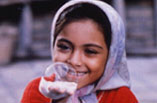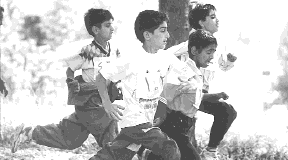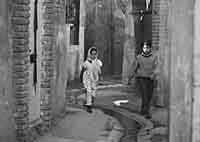FILM NOTES
FILM NOTES INDEX
NYS WRITERS INSTITUTE
HOME PAGE

 The Children of Heaven
The Children of Heaven
(Iranian, 1997, 90 minutes, color, 35mm)
In Farsi with English subtitles
Directed by Majid Majidi
Cast:
Mohammad Amir Naji . . . . . . . . . . Ali's Father
Amir Farrokh Hashemian . . . . . . . . . . Ali
Bahare Seddiqi . . . . . . . . . . Zahra
Fereshte Sarabandi . . . . . . . . . . Ali's Mother
Winner of three main prizes at the 1997 Montreal World Film Festival (including the audience award for most popular feature), this charming new film follows the adventures of eight-year-old Ali as he first attempts to recover, then win, a pair of shoes for his younger sister Zahra. Revisiting familiar Iranian cinematic terrain with considerable charm, Majid Majidi’s third feature deploys the standard narrative device of putting plucky yet vulnerable children on a quest more urgent than their years warrant . . . [Majidi] remains disarmingly focused on how tiny incidents become a big deal to small fry. . . . Much humor and suspense is wrung from incidents that would be minuscule from anything but a child’s point of view, many repeated until they become ingenious running gags. . . . Sum effect is that of warm, simple charm."
— Dennis Harvey, Variety
 "Children of Heaven is very nearly a perfect movie for children, and of course that means adults will like it, too. It lacks the cynicism and smart-mouth attitudes of so much American entertainment for kids and glows with a kind of good-hearted purity. To see this movie is to be reminded of a time when the children in movies where children and not miniature stand-up comics."
"Children of Heaven is very nearly a perfect movie for children, and of course that means adults will like it, too. It lacks the cynicism and smart-mouth attitudes of so much American entertainment for kids and glows with a kind of good-hearted purity. To see this movie is to be reminded of a time when the children in movies where children and not miniature stand-up comics."
— Roger Ebert, Chicago Sun-Times
Four years ago, an Iranian film called The White Balloon served as a wake-up call to those of us who care truly, deeply, madly for international cinema. A delicate shaggy dog tale about a little girl’s quest to purchase the goldfish of her dreams, it was a film that tweaked the most thorough kind of emotionally engaging performance out of its nonprofessional child star, Aida Mohammedkhani.
The news out of Iran, cinematic or otherwise, doesn’t exactly resemble a swift-running stream and so, those of us who were bewitched in 1995 by the devastatingly expressive and adorable Aida can only wonder if she has turned into a fabulous preadolescent. Meanwhile, from Iran, there’s Children of Heaven.
 Like Jafar Panahi’s The White Balloon, this new film by Maji Majidi coaxes the kind of performances out of its two child stars that stun and delight the jaded American audience into remembering just how much a smile and a tear can count on screen.
Like Jafar Panahi’s The White Balloon, this new film by Maji Majidi coaxes the kind of performances out of its two child stars that stun and delight the jaded American audience into remembering just how much a smile and a tear can count on screen.
The two little ones are Air Farrokh Hashemian, about 9 years old, who has huge, deep brown eyes and a boyish chestiness that belies his kind heart and dutiful nature, plus Bahare Sediqi, perhaps 7 years old, who plays his circumspect but guilelessly manipulative younger sister. She’s one who gets the world, including her adoring and, more importantly, respectful older brother to do her bidding by flashing a mere hint of pleasure on her mouth or disappointment in her eyes.
[The film’s] interest is all in the integrity of the two children performances: Hashemian’s earnestness and Sediqi’s enchanting but wholly instinctive feminine wile. As it follows them around their routine in working class Teheran (and, in one sequence, into a breathtakingly privileged neighborhood), the film offers a rare, deeply humanizing view of a people who have recently been shut off by the vagaries of politics from the Western world."
— Susan Stark, Detroit News Film Critic
Children of Heaven shares several traits with other Iranian movies I have seen (notably those by Abbas Kiarostami): a gentle, relaxed style, an almost-poetic fascination with basic images (such as fish swimming in a pool), and the use of numerous, seemingly-unimportant anecdotes to build a larger emotional picture. Children of Heaven isn’t about Zahra’s lost shoes, Dad’s difficulty finding work, or Ali’s placement in the race. It’s about how those things define one family, and why the characters make worthwhile companions for 90 minutes of our time. There’s certainly nothing epic about Majidi’s narrative, but sometimes, as in Children of Heaven, an inconsequential and intimate story can provide a satisfying emotional payoff."
— James Berardinelli
In Children of Heaven, life is sweet despite countless hardships, and no reality beyond the economic intrudes upon a fairy tale atmosphere. Only through heavy-handed emphasis does the quest for new sneakers take on any greater meaning. . . .
The film’s two young stars are as guileless as possible, even when the film contrives to turn the shoe issue into its main dramatic focus. Ali and Zahre meet secretly in the middle of each school day to pass along the sneakers, but that proves to be no solution. Zahre is hampered by ill-fitting shoes at the rigorous girls’ school that she attends. (The film is a production of Iran’s Institute for the Intellectual Development of Children and Young adults, so all school scenes look beneficial and wholesome.)
And Ali, against all odds, determines to run a long-distance race and win the third-place prize of running shoes for Zahra. Not since Rocky left the boxing ring has a sporting contest been filmed as momentously as this school race.
Children of Heaven does provide a kindly, enveloping sense of Iranian life and customs, from the way the family prepares sugar cubes to be served at a mosque to the way Zahra helps care for elderly neighbors. These moments come more easily to Majidi than his studiously bittersweet ending for what is, despite its surface bleakness, an essentially sunny story."
— Janet Maslin, The New York Times
Born in Tehran in 1959, Majid Majidi studied drama at Tehran University before beginning his cinematic career in 1980 as an actor. He then moved behind the camera to direct several short and medium-length films: "Explosion," "Hudaj," "Examination Day," The Last Village" (1993, winner of Best Short at the Isfahan Children’s Festival) and "God Will Come" (1994). Prior to The Children of Heaven, Majidi directed two other features, Baduk (1991) and The Father (1996), both of which were shown at the Montreal World Film Festival.
For additional information, contact the Writers Institute at 518-442-5620 or online at https://www.albany.edu/writers-inst.